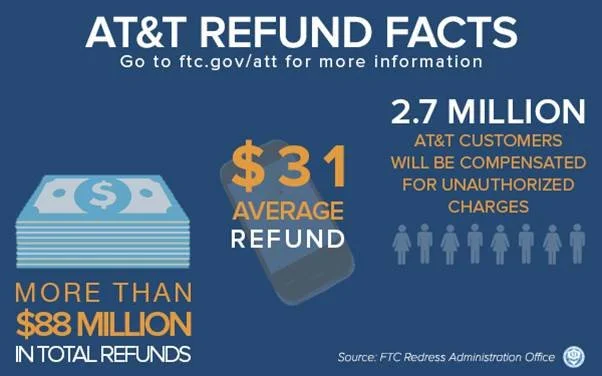Ethical and Legal Considerations With the AT&T Case
The specific mobile marketing law that was violated in this AT&T case was "mobile cramming" as the company billed customers with third-party charges without their consent. It was a surprise to the customers when they looked at their phone bill and were unaware they had additional fees. These included ringtones, horoscopes, text message subscriptions, and fun games for $9.99. What made it even worse was that allegedly, AT&T kept "35% of the charges imposed on its customers" (Fair, 2022).
The negative consequence to the consumer from AT&T's actions is a loss of trust, brand loyalty, and a bad reputation. Customers will now have a negative relationship with AT&T for their sneaky tactics that can also cause them to switch cell phone providers. No one likes to be lied to and taken advantage of and this move by AT&T was very unprofessional, unethical, and just plain wrong. Even though the company refunded their customers on average $31 each, totaling $88 million dollars, it should have never happened in the first place.
Laws and acts that could be violated are the Antitrust Law, the CAN-SPAM Act, and non-compliance for the Federal Trade Commissions Act. By breaking the Antitrust law, someone can report you and an investigator will start looking into your business. The CAN-SPAM Act requires transparency and requires ethical marketing when using the customers' information such as email addresses and phone numbers. For the Federal Trade Commissions Act, those in violation can be charged with the following:
“orders to cease and desist, with fines up to $46,517 per violation should they occur.injunctions by federal district courts. Violations of some Commission rules also could result in civil penalties of up to $40,654 per violation. Violations of court orders could result in civil or criminal contempt proceedings.in some instances, refunds to consumers for actual damages in civil lawsuits.”
- Federal Trade Commission
The kinds of actions that a marketer must take with any mobile marketing campaign to remain ethical are to always remain honest, transparent, and ethical when making business decisions. Maybe if the company was suffering and they needed to increase their prices, they could notify their customers well in advance about the change and explain why they need to raise prices. Were there layoffs? Over spending? Budget issues? Costs increases from labor and manufacturing and purchasing parts? Whatever the problem might have been, it's better to let your customers know that you need help and take action afterwards.
The kinds of actions that a marketer must take with any mobile marketing campaign to remain ethical is to always ask for permission and have open communication with their customers and audience. Never do anything unethical and sneaky without asking for the consumers' consent and eliminate all "black hat" techniques to ensure that all information and content is reliable, correctly sourced, transparent, and is fair.
References:
Fair, L. (2022, May 24). $88 million back for AT&T customers: An inside look at a refund program. Federal Trade Commission. https://www.ftc.gov/business-guidance/blog/2016/12/88-million-back-att-customers-inside-look-refund-program
Staff, the P. N. O., & Staff, D. P. I. P. and C. T. O. (2022, January 28). Advertising and marketing on the internet: Rules of the road. Federal Trade Commission. https://www.ftc.gov/business-guidance/resources/advertising-marketing-internet-rules-road#non

